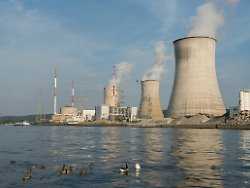updates
“High energy prices due to war”
Belgium postpones nuclear phase-out by ten years
03/18/2022, 9:58 p.m
Two Belgian nuclear power plants are to run ten years longer than planned. Shortcomings have caused concern in the past – also in Germany. The Belgian government justified the decision with the Ukraine war and the high energy prices.
Belgium wants to postpone nuclear phase-out by ten years. The Tihange 3 nuclear power plant near the German border and the Doel 4 nuclear power plant near Antwerp should be able to continue operating at least until the end of 2035. This was confirmed by Belgian Prime Minister Alexander De Croo in the evening after government consultations.
The purpose of extending the service life is to ensure energy security in Belgium. The war in Ukraine and the recently sharp rise in energy prices also play a role. The planned extension of the service life now has to be negotiated with the operator Engie. He had actually prepared to shut down the power plants by the end of 2025 at the latest and is now likely to demand a lot of money for the change of plan.
What Belgium sees as a solution to a potential energy shortage has been a concern for Germany for years. Defects, such as dilapidated concrete parts, have been identified several times in the seven Belgian nuclear reactors that are currently in operation. The city of Aachen and the federal government have therefore repeatedly called for the reactors to be shut down in the past. The oldest are from the 1970s.
However, the topic of extending the service life has recently been discussed again in Germany. The war in Ukraine and soaring gas prices have shown how dependent Europe is on fossil fuels – particularly Russia, which supplies around 40 percent of the EU’s gas and around 55 percent in Germany. For example, Bavaria’s Prime Minister Markus Söder said that longer operation of the remaining nuclear power plants in Germany could “help a lot” for a limited period of time.
Extension debate also in Germany
However, Federal Economics and Environment Minister Robert Habeck has made it clear that the preparations for shutting down the last three nuclear power plants in Germany by the end of the year are already too far advanced to keep them in operation. In Belgium, the phase-out of nuclear power was already laid down in law in 2003, but the debate has dragged on for years. More than half of the electricity consumed in 2021 was produced by nuclear power, according to grid operator Elia. Last year Prime Minister De Croo’s government agreed on two scenarios.
Plan A: A phase-out by the end of 2025 with higher investments in new gas-fired power plants. Plan B: Keeping two reactors running. Until recently, Plan B was considered unlikely. The operator Engie warned in December that it seemed impossible to guarantee the extension beyond 2025 – if only because of the cumbersome and time-consuming change in the law.
In times of Russian aggression, however, nuclear power seems to be becoming socially acceptable again. In January, the regulator AFCN found that the two reactors could continue to operate under certain conditions. Energy Minister Tinne Van der Straeten from the Greens, who had previously resisted, ultimately backed the proposal. “We have a policy based on affordability, security of supply and sustainability,” she told the German Press Agency.
Nuclear power indirectly produces CO2
Even though Belgium is less dependent on Russian gas than Germany thanks to a liquefied natural gas (LNG) terminal, concerns about power and energy shortages are high and the government wants to get rid of Russian gas completely as soon as possible. Then there is the energy transition with the need to reduce greenhouse gas emissions such as carbon dioxide (CO2).
The independent energy and nuclear policy analyst Mycle Schneider points out that nuclear power also produces indirect CO2 emissions – for example in the construction of power plants or in uranium production – but these are still lower than with gas, the fossil energy source with the lowest emissions. However, Schneider sees no solution to the current energy concerns in extending the lifetime of the nuclear power plant. “It’s not as if the problem has been solved in the long term, it’s just been postponed for a few years.” The money that would be invested for the technical extension could be put into renewable energies in a more climate-efficient manner – that would lead to fewer greenhouse gas emissions such as CO2 more quickly.
